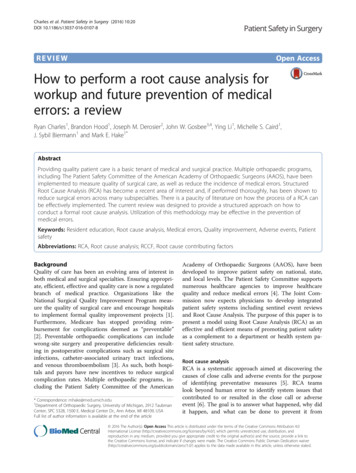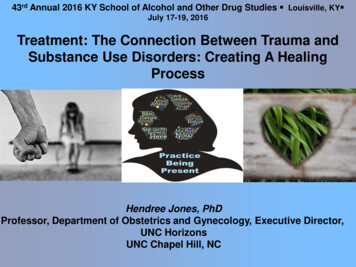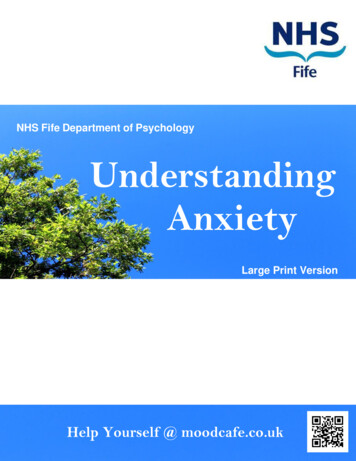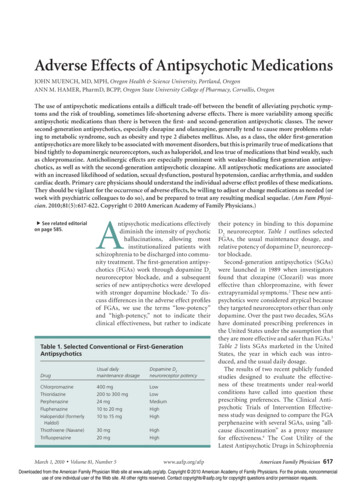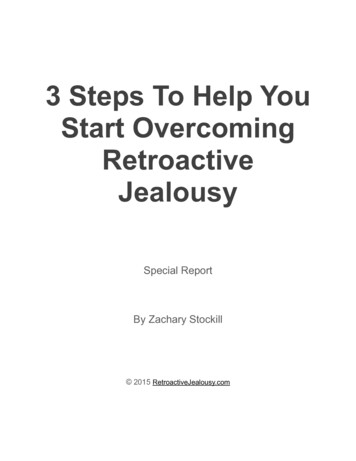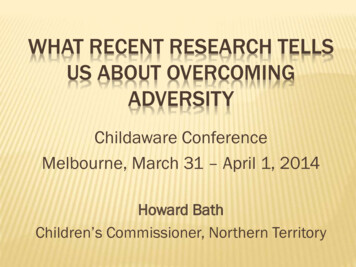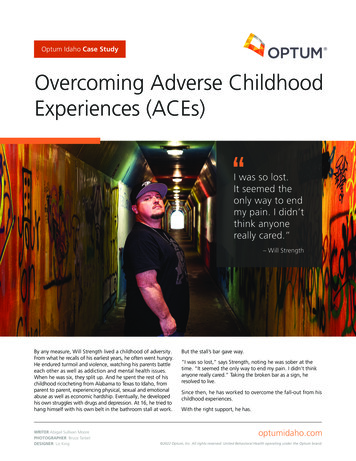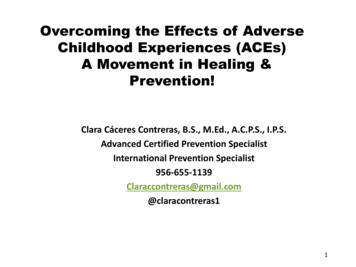
Transcription
Overcoming the Effects of AdverseChildhood Experiences (ACEs)A Movement in Healing &Prevention!Clara Cáceres Contreras, B.S., M.Ed., A.C.P.S., I.P.S.Advanced Certified Prevention SpecialistInternational Prevention aracontreras11
The “ACE” StudyThe Tragic Consequences of UnaddressedChildhood TraumaAnna CarolineJennings StoryThis is Anna at age one1960 - 1992and a halfThis is Anna years later – in amental institution
WhatHappened?7/21/20163
ACE StudyAdverse Childhood ExperiencesWounds that Won’t Heal – 9 min videohttp://www.youtube.com/watch?v tMXtOxXBCRoFamily Secrets!4
Roles We Play!5
3 Rules! Not to Tell Not to Trust Not to Feel6
Beginning to Heal! Not Your Fault You Did NotCause It Child not Adult Learning NewSkills to Cope7
Impact of Trauma Over theLife SpanEffects of ChildhoodAdverseExperiences, ACE’sStudy(Anda & Fellitti) Neurological Biological Psychological Socialhttp://www.cdc.gov/ace/index.htm7/21/20168
What are ACES?http://vetoviolence.cdc.gov/apps/phl/resource center infographic.htmlNPR - ACE your-ace-score/9
Shift OurPerspectiveChange our paradigmWhat happened?Provides context, fosters compassion, helps us to seestrengths & courage in face of adversity.
Adverse Childhood Experiences(ACEs) StudySummary of FindingsAdverse Childhood Experiences (ACEs) are: very common, and strong predictors of health risks & disease fromadolescence to adulthoodThis combination of findings makes ACEs one of the leading,if not the leading determinant of the health & social wellbeing of our nationhttp://www.cdc.gov/ace/index.htm11
Impact of Trauma on the Child Cognitive/academic Physical Emotional Spiritual Developmental
ACE & School PerformanceTraumatized children are: 2.5x more likely to fail a grade in school score lower on standardized achievement tests more likely to have struggles in receptive &expressive language suspended & expelled more often frequently placed in special education13
Facts about Trauma on the Brain Lack of attachment can result in physical structuraldamage on the amygdala and limbic functions. Studies show that these areas are stunted and smaller. Infants exposed to extreme levels of arousal (corticotropin,noradrenaline, adrenaline levels in the brain)– too low in case of neglect- too high in case of abuseexperience an extended period of negative emotionalstate, overall disorganization and the de-regulation ofhomeostasis.Perry, B., Pollard, R., Blakley, T., Baker, W., & Vigilante, D. (1995). Childhood trauma, theneurobiology of adaptation, and ‘use-dependent’ development of the brain: How ‘states’become ‘traits.’ Infant Mental Health Journal, 16(4), 271-291. Retrieved April 19, 2008,14from PsycINFO database.
Brain Development & Trauma – 5 minhttps://www.youtube.com/watch?v RYj7YYHmbQs7/21/201615
Brain & SurvivalOur mindmisinterpretsituations orcircumstancesbecause ofingrainedpatternsexperience,emotions, andreaction.These reactionsopen us toexperiences thathave the texture ofstress, anxiety,frustration, angerand fear.Courage to Move from Scared or Anger to Resilience16
Toxic StressBrain is overwhelmedwith “Cortisone”Why Zebras Don‘t have UlcersStress Portrait of a Killer, Nat. Geo.,Dr. Sapolsky, (Telomeres)http://www.youtube.com/watch?v efbJ5w803cgThe brain cannotphysiologicallytake in newknowledge orproblem solvewhen it'sSTRESSED!!!
Trauma Impact on theBrain If there is danger, the“THINKING” brain shutsdown, allowing the“DOING” brain to act Traumatized childrenexperience changes inbrain structures, neurochemistry & geneticexpression
Hijacked Brain“Freeze, Fight, Flight”
SHAME SYMPTOMS ADDICTION VIOLENCE DEPRESSION“Origins of Addiction”, Dr. Fellitti“Shame”, Dr. Brene Brown20
SHAME VS EMPATHYSHAME BREEDSEMPATHY LEADS INPERFECT INADEQUATE INCAPABLILABLE FEAR UNWORTHY DISCONNECT ISOLATE7/21/2016 TRUST BELONGING COMPASSION CONNECTION COURAGE RESILIENCEModule 3 Empathy21
SHAME TRIGGERSDON’T JUDGE CRITIZE BLAME MINIMIZE SHOULD7/21/2016Module 3 EmpathyNO NO SARCASM NO NAGGING NO LECTURING No DEMANDS No ORDERS22
FlashbackSensory TriggersBring Up TraumaMemories!23
SPECTRUM OF EMOTIONSPhysical AilmentsActing In(no feelings)Stuck MindEmotions Push Down(Disconnect)Body Mind FluidPresentBalancedStuck BodyEmotion Out (Chronic)Emotional AilmentsActing Out(no mind)High Blood PreNumbAngerRageOut BurstIrritable BowelNumbCautiousParanoiaEating DisorderChronic FatigueNumbHurtDespair/HopelessSelf h oor vityImmuneNumbConcernAnxietySex AddictionChronic ShameControllingFailure ThriveNumbRejectedAbandonedClingingPediatric Bipolar-Disruptive Mood Dysregulation Disorder DSM-5
SPECTRUM OF EMOTIONSPhysicalAilmentsChronic(no feelings)Stuck in MindEmotions ncedStuck BodyEmotion Out ofControlEmotionalAilments(no mind)(Chronic)Learning How to Regulate Our Emotions & Creating a INGOut
Impact on RelationshipsRelationships are developed through the emotional bondbetween the child & primary caregiver. It is through thisrelationship we learn to: Regulate emotions - “self soothe” Develop trust in others Freely explore our environment Understand ourselves & others Understand that we can impact the world around us
Child You Can’t Seem to Reach What’s Really Going?27
29
Reading List “A Child Called It”, by DavePultzer “The Boy Raised Like aDog”; “Born for Love”, byDr. Bruce Perry “Guilty by Reason ofInsanity”, by DorothyLewisDr. Sapolsky, Dr. Gabor Matehttps://www.youtube.com/watch?v o-brqskIoBw
ToolboxTrauma-sensitivepractices acknowledgethe prevalence oftraumatic occurrence inchildren's lives andcreates a flexibleframework providesuniversal supports, issensitive to uniqueneeds of children and ismindful of avoiding retraumatization.Resilience Practices Empathy Relationships Social Emotional Restorative Practices Mindful Skills 40 Assets School Connectedness
Building Adult Capabilities to ImproveChild OutcomesA Theory of ChangeAdults acknowledge the prevalence of traumaticoccurrence in Childs’ lives & create a flexibleframework that provides universal supports, issensitive to unique needs of child & is mindful ofavoiding du/resources/multimedia/videos/theory of change/32
CULTIVATING OUR BRAINNegative ThoughtsWhen trust is brokenor one negativeinteraction, it takes5-7 positiveinteractions to makeup for it!Why? The brain iswired to notice thenegative as a(threat)!Positive Thoughts
Reframe the thinkingNegative rIllnessChronicEarly Death(Thinking & Actions)Make Stress Your Friend!Positive ThinkingSelf GrowthResilience
ToolboxTrauma-sensitivepractices acknowledgethe prevalence oftraumatic occurrence inchildren's lives andcreates a flexibleframework providesuniversal supports, issensitive to unique needsof children and is mindfulof avoiding retraumatization.Resilience Practices/Tools Empathy Relationships Social Emotional Restorative Practices Mindful Skills 40 Assets School Connectedness
Trauma Sensitive SchoolsModule 1 – Introduction to Trauma – 11 Min. Module 2 – A Sense of Safety – 11 Min. Module 3 – Creating Safety – 11 Min. Module 4 – Relationships - 14 min. Module 5 – Trauma and the Brain – 13 min. Module 6 – Self-Regulation – 12 min. Module 7 – Empowerment – 8 min. Module 8 – Self-Care – 10 min. Module 9 – Disciplinary Practices – 9 min.Videos created by Madison Metropolitan School ma/e-resources37
Sources of Information Wisconsin Toolkit – rces ACES Connection - http://www.acesconnection.com/ Helping Traumatized Children Learn - Massachusetts Advocates forChildren 2005 http://www.massadvocates.org/order-book.php The Heart of Learning & Teaching Compassion, Resiliency & AcademicSuccess earning.aspx Child Trauma Toolkit for Educators National Child Traumatic StressNetwork http://rems.ed.gov/docs/NCTSN ChildTraumaToolkitForEducators.pdf Creating Sanctuary in Schools 1995 http://www.sanctuaryweb.com/PDFs new/Bloom%20Sanctuary%20in%20the%20Classroom.pdf
Steps to Creating a Movement1.2.3.4.5.Engage LeadershipPerform AssessmentsReview LiteratureProvide TrainingImplement Strategies Brain Safety Empowerment Collaboration Choice Trust
So What? What did you find interesting? What’s tools do we need? What's our next step?
Overcoming the Effects of Adverse Childhood Experiences (ACEs) A Movement in Healing & Prevention! . -too low in case of neglect-too high in case of abuse experience an extended period of negative emotional state, overall disorganization and the de-regulation of

